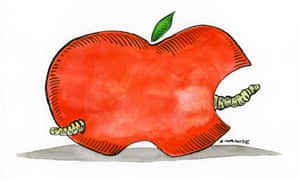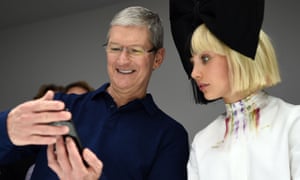Aditya Chakrabortty in The Guardian
Human battery hens make Apple’s devices in China. The company, which has a bigger cash pile than the US government, symbolises a broken economic system
 Illustration by Andrzej Krauze
Illustration by Andrzej KrauzeSoon enough, we will see the first obituaries for openness, free trade and globalisation. When those writers ponder how wealthy countries turned towards the politics of Donald Trump and Nigel Farage, they should devote a large chapter to Apple. Because the world’s richest company is a textbook example of how the promises made after the fall of the Berlin Wall have been made a mockery of.
Whatever marvels have been shoved into the new iPhones, the devices serve to increase the gulf between the super-rich and the rest of us, bilk countries of rightful tax revenues, and oppress Chinese workers even while depriving Americans of high-paying jobs. Arrogant towards critics and governments, glutted with cash and yet plainly out of ideas, Apple is elegant shorthand for a redundant economic system.
None of this is how we’re meant to think of Apple, the multinational that is both on your side yet restlessly questing ahead. While launching the iPhone 7 this month, its marketing chief, Phil Schiller, explained why this model came without a earphone socket: “It really comes down to one word: courage. The courage to move on, do something new, that betters all of us.” Such patchouli-scented Californian dipshittery was lapped up by the 7,000-strong crowd and lightly mocked by the press – but it also helps to obscure some of the less tolerable aspect of the iPhone business model, such as the conditions in which it is made.
If you own an iPhone it was assembled by workers at one of three firms in China: Foxconn, Wistron and Pegatron. The biggest and most famous, Foxconn, came to international prominence in 2010 when an estimated 18 of its employees tried to kill themselves. At least 14 workers died. The company’s response was to put up suicide nets, to catch people trying to jump to their death. That year, staff at Foxconn’s Longhua factory made 137,000 iPhones a day, or around 90 a minute.
One of those attempted suicides, a 17-year-old called Tian Yu, flung herself from the fourth floor of a factory dormitory and ended up paralysed from the waist down. Speaking later to academic researchers, she described her working conditions in remarkable testimony that I then covered for the Guardian. She was essentially a human battery hen, working over 12 hours a day, six days a week, swapped between day and night shifts and kept in an eight-person dorm room.
After the scandals of 2010, Apple vowed to improve conditions for its Chinese workers. It has since published a number of glossy brochures extolling its commitments to them. Yet there is no evidence that the Californian firm has given back a single penny of its gigantic profit margins to its contractors to ensure better treatment of the people who actually make its products.
Over the past year, the US-based NGO China Labor Watch has published a series ofinvestigations into Pegatron, another iPhone assembler. It sent a researcher on to the assembly line, interviewed dozens of Pegatron staff and analysed hundreds of pay stubs. Among its findings are that staff still work 12 hours a day, six days a week – one and a half hours of that unpaid. They are forced to do overtime, claims the NGO, and provided with illegally low levels of safety training.
The researcher was working on one iPhone motherboard every 3.75 seconds, standing up for the entirety of his 10.5-hour shift. Such is the punishment endured at Apple’s contractors to make a living wage, apparently.

FacebookTwitterPinterest Tim Cook with dancer Maddie Ziegler. The Apple CEO ‘rejects a €13bn tax bill from the EU as ‘political crap’’. Photograph: Josh Edelson/AFP/Getty Images
The Shanghai local government has raised the minimum wage over the past year; Pegatron has responded by cutting subsidies on things such as medical insurance so that the effective hourly pay for its staff has fallen.
When questioned about these reports, Pegatron provided a statement that read in part: “We work hard to make sure every Pegatron facility provides a healthy work environment and allegations suggesting otherwise are simply not true … We have taken effective measures … to ensure employees do not work more than 60 hours per week and six days per week.”
At another of Apple’s major contractors, Wistron, a Danish human-rights NGO last year found extensive evidence of forced student labour. Teenagers doing degrees in accountancy or business management were sent for months to an assembly line at Wistron. This is a serious violation of International Labour Organisationconvention, yet investigators for Danwatch found evidence that thousands of students were doing the same work and backbreaking hours there as the adults – but costing less.
The teenagers told Danwatch that they were working against their will. “We are all depressed,” one 19-year-old girl said. “But we have no choice, because the school told us that if we refused, we would not get our diploma.” Despite several requests for comment, Wistron did not respond.
That investigation was not at a factory making iPhones, but Apple confirmed that Wistron and Pegatron were two of their major assemblers in China. While it did not wish to say anything on the record, Apple’s press officers pointed me to the audits it had commissioned into its supplier factories. Yet the inspections are almost conveniently skimpy.
Look at the report Apple commissioned into Foxconn in 2012, after those suicide attempts. Foxconn is the largest private employer in China, with around 400,000 workers at the Longhua factory alone. Yet the report for Apple, complementary to an investigation already being carried out by the Fair Labor Association, admits to looking at just three of those plants for three days apiece. Jenny Chan, one of the foremost scholars of Chinese labour abuses and co-author of the forthcomingDying for an iPhone, calls it “parachute auditing – a way to allow ‘business as usual’ to carry on”. A very profitable way, as it happens. While iPhone workers for Pegatron saw their hourly pay drop to just $1.60 an hour, Apple remained the most profitable big company in America, pulling in over $47bn in profit in 2015 alone.
What does this add up to? At $231bn, Apple has a bigger cash pile than the US government, but apparently won’t spend even a sliver on improving conditions for those who actually make its money. Nor will it make those iPhones in America, which would create jobs and still leave it as the most profitable smartphone in the world.
It would rather accrue more profits, to go to those who hold Apple stock – such as company boss Tim Cook, whose hoard of company shares is worth $785m. Friends of Cook point to his philanthropy, but while he’s happy to spend on pet projects, he rejects a €13bn tax bill from the EU as “political crap” – whileboasting about how he won’t bring Apple’s billions back to the US “until there’s a fair rate … It doesn’t go that the more you pay, the more patriotic you are.” The tech oligarch seems to think he knows better than 300 million Americans what tax rates their elected government should set.
When the historians of globalisation ask why it died, they will surely find that companies such as Apple form a large part of the answer. Faced with a binary choice between an economic model that lavishly rewarded a few and a populism that makes lavish promises to many, between Cook on the one hand and Farage on the other, the voters went for the one who at least didn’t bang on about “courage”.